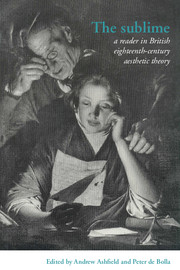Book contents
- Frontmatter
- Contents
- List of Abbreviations
- Introduction
- Part I The Longinian tradition
- 1 Dionysius Longinus on the sublime (1743)
- 2 Remarks on a book entitled, Prince Arthur (1696)
- 3 The advancement and reformation of modern poetry (1701)
- 4 The grounds of criticism in poetry (1704)
- 5 Essays upon several subjects (1716)
- 6 A miscellany of ingenious thoughts (1721)
- 7 An essay on the theory of painting (1725)
- 8 Reflections on the nature and property of languages (London 1731)
- 9 The works (1735)
- 10 Lectures on poetry (1742)
- Part II Rhapsody to rhetoric
- Part III Irish Perspectives
- Part IV The Aberdonian Enlightenment
- Part V Edinburgh and Glasgow
- Part VI From the Picturesque to the Political
- Sources and further reading
9 - The works (1735)
Published online by Cambridge University Press: 05 June 2012
- Frontmatter
- Contents
- List of Abbreviations
- Introduction
- Part I The Longinian tradition
- 1 Dionysius Longinus on the sublime (1743)
- 2 Remarks on a book entitled, Prince Arthur (1696)
- 3 The advancement and reformation of modern poetry (1701)
- 4 The grounds of criticism in poetry (1704)
- 5 Essays upon several subjects (1716)
- 6 A miscellany of ingenious thoughts (1721)
- 7 An essay on the theory of painting (1725)
- 8 Reflections on the nature and property of languages (London 1731)
- 9 The works (1735)
- 10 Lectures on poetry (1742)
- Part II Rhapsody to rhetoric
- Part III Irish Perspectives
- Part IV The Aberdonian Enlightenment
- Part V Edinburgh and Glasgow
- Part VI From the Picturesque to the Political
- Sources and further reading
Summary
How the mind is raised to the sublime
They who never felt that kind of enthusiasm, which Aristotle, and Longinus mention, as necessary to succeed in poetry, and produce the sublime in writing, will be little the better informed, from what may be said, to give an idea of it. He, who can behold without emotion, and surprise the more noble works of nature, and of art, will gain, even from the most expressive words, and strongest terms, but a very faint notion of what is not so easily described, or taught, as conceived by a mind truly disposed for the perception of that, which is great and marvellous.
All the vast, and wonderful scenes, either of delight, or horror, which the universe affords, have this effect upon the imagination, such as unbounded prospects, particularly that of the ocean, in its different situations of agitation, or repose; the rising and setting sun; the solemnity of moon light; all the phenomena in the heavens, and objects of astronomy. We are moved in the same manner by the view of dreadful precipices; great ruins; subterraneous caverns, and the operations of nature in those dark recesses. The like is often produced by that greatness, which results from the ornaments, and magnificence of architecture; the sight of numerous armies, and assemblies of people. We are no less inspired, if it may be so called, by that kind of ardour from the charms of beauty, or the resemblance of beautiful persons, and things in fine statues, or paintings.
- Type
- Chapter
- Information
- The SublimeA Reader in British Eighteenth-Century Aesthetic Theory, pp. 53 - 54Publisher: Cambridge University PressPrint publication year: 1996



